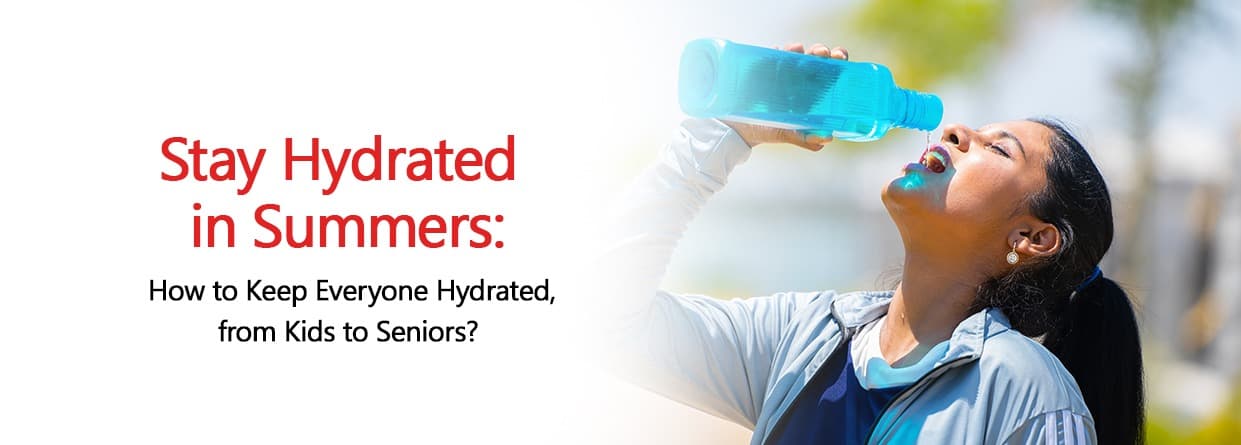
Summer heat can dehydrate anyone—but kids, outdoor workers, and seniors are especially at risk. Dehydration doesn’t just cause tiredness or headaches; it can lead to serious health issues if ignored. This blog explains how hydration needs vary by age, what signs to watch for, and practical ways to stay hydrated—from daily water intake to hydration tips for skin and hair. Whether you're caring for a child or looking after your own health, staying ahead of dehydration is key to enjoying summer safely.
Summer is fun—but it can drain your body fast. Dehydration affects people of all ages, especially during hot weather.
According to the NHS and WebMD, even mild dehydration symptoms like tiredness and headaches can reduce productivity. If ignored, it can lead to serious health issues.
The risk rises for kids, adults working outdoors, and the elderly. So, the key takeaway? Stay hydrated, always. But how to stay hydrated in hot weather, and how do needs vary by age?
In this blog, we share practical tips for every age group. Plus, we'll help you understand symptoms of dehydration, how to prevent it, and what you can do to maintain a healthy, hydrated body and even hydrated skin and hair.
Heat makes you sweat. When you sweat, you lose water and vital minerals.
This leads to dehydration, especially when:
Sweat cools your body, but too much loss can lower blood pressure, affect brain function, and even cause confusion. Children sweat more per surface area, and seniors feel less thirst. That makes both groups more vulnerable. This is why knowing how to stay hydrated becomes essential.
There’s no one-size-fits-all when it comes to hydration. Fluid needs vary by age, weight, activity, and climate. Here’s a quick guide:
|
Age Group |
Recommended Fluids Per Day |
|
Children (1–8 yrs) |
4–6 glass (1–1.5 litres) |
|
Kids (9–13 yrs) |
6–8 glass (1.5–2 litres) |
|
Adults (14–64 yrs) |
8–10 glass (2–2.5 litres) |
|
Seniors (65+ yrs) |
8 glass or more, depending on health |
Tip: Water-rich fruits like watermelon and cucumber help too. So do soups and broths.
Many people overlook dehydration symptoms until they become serious. According to health experts, here are the 10 signs of dehydration you must watch for:
These symptoms of dehydration can show up quickly in summer. If left untreated, they may require dehydration treatment like electrolyte replacement or even IV fluids.
Dehydration treatment starts with drinking water or rehydration solutions. But the best treatment? Prevention.
Children are active and distracted. They don’t always drink enough. Here’s how to help your child stay hydrated:
If your child complains of a tummy ache, tiredness, or dry lips, check for symptoms of dehydration. Treat early with fluids.
Adults sweat more, especially while working or exercising in the heat. Here’s how to stay hydrated in hot weather:
Add water-rich foods like salads and soups. This keeps both your body and hydrated skin in top form. Dehydration doesn’t just drain energy—it affects how you feel and how you look.
Seniors are at high risk for dehydration, especially in hot weather. They may not feel thirsty or might be on medication that increases fluid loss.
Here's how to stay hydrated as a senior:
Watch for confusion, sudden fatigue, dry mouth, or reduced urination. These are all classic dehydration symptoms in older adults.
Hydration isn't just internal. A hydrated body reflects on your skin and hair too. Here’s how to keep skin hydrated in summer:
And how to keep hair hydrated:
A healthy body keeps your skin glowing and hair shiny, even in peak summer.
Staying hydrated is one of the simplest ways to stay healthy. It supports digestion, boosts energy, protects your skin, and sharpens your mind.
Key tips to stay hydrated:
This summer, make hydration a family goal. A little awareness and effort will protect your loved ones from the dangers of dehydration. It’s time to stay hydrated, stay active, and enjoy the sunshine—safely.
Adults should aim for 8–10 cups (2–2.5 litres) daily, depending on activity and climate.
No, fluids from tea, milk, soups, and water-rich foods also count.
Yes, excessive intake can lead to water intoxication or low sodium levels (hyponatraemia).
Dry mouth, dark urine, fatigue, dizziness, and headaches are common signs.
No, they can cause more fluid loss; water and milk are better choices.
Yes, diuretics, laxatives, and some blood pressure meds can increase fluid loss.
Written and Verified by:
-Dr.-Sujoy-Mukherjee-(-Oral-%26-Maxillofacial-).webp&w=256&q=75)
Consultant - Oral & Maxillofacial Science Exp: 25 Yr
Oral & Maxillofacial Science
Dr. Sujoy Mukherjee is a Consultant in Oral & Maxillofacial Science at CMRI, Kolkata, with over 18 years of experience. He specializes in Maxillofacial Surgery Oral Surgery.
Similar Internal Medicine Blogs
Book Your Appointment TODAY
© 2024 CMRI Kolkata. All Rights Reserved.